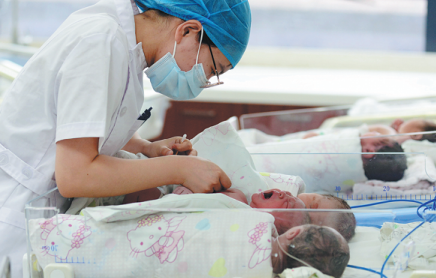Campaign to ensure more children insured
By Wang Xiaoyu | China Daily | Updated: 2024-03-05 09:09
China plans to expand basic medical insurance coverage for children by streamlining enrollment procedures and stepping up advocacy campaigns, according to a circular released by the National Healthcare Security Administration last week.
The document said that by the end of next year, more than 80 percent of newborns will be covered by national basic medical insurance within a year of birth and that the insurance coverage rate for children may further increase around the end of 2025.
To achieve these objectives, the administration said that nursery care facilities, communities and employers should be mobilized to spread awareness about insurance enrollment among parents.
Under normal circumstances, newborns should be insured within 90 days of birth and all medical expenses incurred during the period should be reimbursable, the circular said.
"Local governments should integrate processing of registrations and other affairs related to newborns and step up information sharing between healthcare security and health authorities," it said.
The circular added that localities should explore the scrapping of residential registrations that would hinder children from enrolling in insurance programs at their places of residence or where they go to school.
"It is also important to monitor rates of insured children and analyze reasons for uninsured primary or middle school students," it added.
China's national healthcare insurance program provides a basic safety net for children. As of last year, about 256 million children were enrolled, according to the administration.
"However, problems such as lengthy and complicated steps for getting enrolled, lack of awareness among some parents and residential restrictions still exist," it said.
Ma Li, the mother of a 4-month-old girl in Wuxi, Jiangsu province, said that she applied for a medical security card, along with a birth certificate, for her daughter on Dec 13 and made the first payment on Dec 21. "The procedures were quite easy and I finished them online," she said.
Ma said that she vaguely remembered a medical staff member reminding her about medical insurance when she was hospitalized to give birth, but did not pay much attention at the time.
"It was not until my baby had symptoms of neonatal jaundice and infection and needed to check into the hospital that I seriously got down to look up information about medical insurance for infants," she said.
"Eventually, the course of treatment for my daughter cost around 3,000 yuan ($417). Thanks to the insurance policy, more than half of the medical fee can be reimbursed."
However, to receive reimbursement for medical expenses, Ma said she had to visit a community hospital, which only opens two days a week to handle such cases. "I submitted all the required materials on Jan 9 and have not received my reimbursement yet," she said.
Ma added that her husband's company offers the benefit of a commercial insurance plan for its employees' children, and she is also considering purchasing a critical illness insurance plan for her baby.
Cai Fucheng, a pediatrician at Wuhan Union Hospital of China, told People's Daily that the insurance coverage rate for newborns at the hospital has topped 95 percent thanks to strengthened efforts to promote awareness when providing prenatal and postnatal care.
wangxiaoyu@chinadaily.com.cn

























